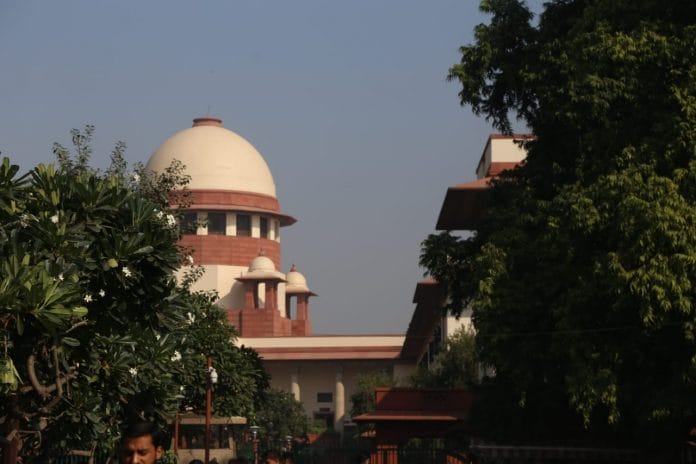New Delhi: The Supreme Court Wednesday rejected the review petition filed by Akshay Kumar Singh, one of the four men convicted in the 2012 December gangrape and murder case and awarded death penalty.
The court said there was no ground to say it’s not a rarest of the rare case.
A three-judge bench of Justice R Banumathi, Justice Ashok Bhushan and Justice A.S. Bopanna announced the judgment after hearing Akshay’s lawyer A.P. Singh for 30 minutes and Solicitor General Tushar Mehta, who was appearing for the Delhi Police.
Reading out the verdict, Justice Bhanumathi said “the petitioner has again sought to assail the merits of the prosecution case”.
“Grounds raised by the co-accused in their review pleas of 2018 are similar to the grounds raised in this one. In so far as flaws in investigation, all of the submissions were concerned by SC and trial court. No ground of review justifies the submission that the Nirbhaya case does not fall under rarest of rare case,” said the court.
Akshay had sought a review of the 2017 Supreme Court judgment upholding his death penalty in the case. The verdict was delayed by a day after Chief Justice of India S.A. Bobde Tuesday rescued himself from hearing the the review plea, saying one of his relatives had represented the victim in the case.
Akshay, 33, along with the other three convicts Mukesh (30), Pawan Gupta (23) and Vinay Sharma (24), brutally gangraped a 23-year-old paramedical student in a moving bus on the intervening night of December 16-17, 2012. The woman died of her injuries a few days later.
Curative plea last option
Mukesh, Pawan and Vinay had earlier filed a review plea against the 2017 verdict of the top court confirming death penalty to the convicts. The plea had been dismissed.
They can now file a curative plea before hanging.
A curative petition is the last resort of the Supreme Court to commute a death sentence into a life imprisonment. However, there is no time limit given for filing a curative petition. Article 137 of the Constitution gives power to the Supreme Court to review its judgments and orders.
The apex court had on 9 July last year dismissed the review pleas filed by the three other convicts — Mukesh, Pawan Gupta and Vinay Sharma — in the case, saying no grounds had been made out by them for review of the 2017 verdict.
The 23-year-old paramedic student was gangraped on the intervening night of 16-17 December 2012, inside a running bus in south Delhi by six people and severely assaulted before being thrown out on the road. She succumbed to injuries on 29 December at the Mount Elizabeth Hospital in Singapore.
One of the accused in the case, Ram Singh, had allegedly committed suicide at Tihar jail in Delhi. The sixth accused was a minor, and was convicted by a juvenile justice board. He was released from a reformation home after serving a three-year term.
Also read: Delhi court defers hearing plea on issuing death warrants against Nirbhaya case convicts
‘Girl’s dying declaration was improvised’
Arguing that he had new facts to represent on the case, Akshay’s lawyer Singh said there was media and public pressure to implicate his client. Singh also raised doubts about the veracity of the victim’s dying declaration and said it was “improvised” upon.
He also questioned the credibility of the prime witness, the victim’s friend, in the case. The witness was with her on the fateful night of 16 December. Singh accused the witness of accepting a bribe of Rs 2 lakh.
Justice Bhanumathi, however, reminded the counsel that detailed arguments on all of these aspects were made earlier and rejected.
Akshay, in his plea, had stated that “the state must not simply execute people to prove that it is attacking terror or violence against women. It must persistently work towards systematic reforms to bring about change”.
Singh also cited an excerpt from former Tihar jail officer Sunil Gupta’s book where the author concludes that accused Ram Singh may have been murdered.
Justice Bhushan, however, said arguments against factual assertions couldn’t be made at this stage.
Referring to the Ryan International School murder case of 2017, the lawyer also pointed out that demands for a CBI inquiry into the Nirbhaya incident was turned down.
The CBI’s findings into the Ryan student murder case had proved to be a major embarrassment for the Gurugram police, which had blamed the conductor of a school bus, Ashok Kumar, for the murder of seven-year-old student Pradyuman Thakur. The investigating agency later found that a teenager had killed the boy inside the school toilet.
Also read: Grandson of hangman who executed Indira’s killers says he’ll do the job for Nirbhaya rapists






